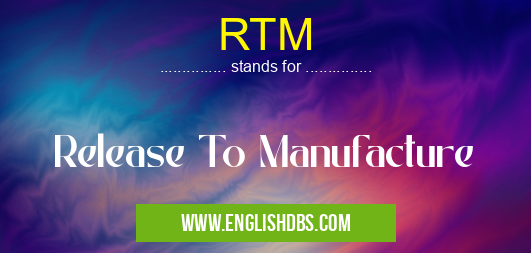What does RTM mean in GENERAL
Release to Manufacture (RTM) is a term used in the software development process to indicate that the code has been tested and is ready for manufacturing. It is the final stage of a software product's development, where all code and documentation has been completed and the product is ready for release to customers or distribution partners. RTM typically occurs after Alpha and Beta releases, when the software has gone through extensive testing and debugging and all known bugs have been fixed. Once RTM is reached, a company may begin marketing efforts or shipping physical products based on the software.

RTM meaning in General in Business
RTM mostly used in an acronym General in Category Business that means Release To Manufacture
Shorthand: RTM,
Full Form: Release To Manufacture
For more information of "Release To Manufacture", see the section below.
Role Of The Testers During The RTM Process
During the Release To Manufacture process, testers play an essential role in ensuring that the product meets quality standards before being released. Testing begins with early versions of the code, such as Alpha or Beta releases, which allow developers to find and fix issues before launching a full-scale release. As each version progresses closer to completion, testers continue to check features, functionality, usability, and performance until there are no more significant changes needed – thus indicating that RTM has been achieved.
Benefits Of Reaching The RTM Stage
The primary benefits of reaching Release To Manufacture are cost savings from fewer required changes later down the line and increased customer satisfaction with a smooth user experience upon launch. By rigorously testing earlier versions of the code prior to RTM being achieved, companies can quickly identify potential issues such as bugs or compatibility problems before they become too costly to address once fully released to customers. Additionally, once RTM has been reached it reduces risk associated with launching faulty products or services.
Essential Questions and Answers on Release To Manufacture in "BUSINESS»GENERALBUS"
What is a Release to Manufacture (RTM)?
Release to Manufacture (RTM) is an official term used in the software development life cycle that denotes the final version of a product that has been approved for public release. The RTM version is typically the one sent-out to manufacturers who will use it to produce physical copies.
How do I know if I have an RTM version?
If you purchased a software product off the shelf, it will include a label or packaging identifying the software's version number and stating it as “Release to Manufacture”. For digital downloads, the RTM version can be identified by its file name and its installer window, which may also indicate that it is the certified RTM version.
What are the advantages of using an RTM version?
The Release to Manufacture (RTM) version offers reassurance that your product includes all tested features and bug fixes released up until that point in time. Installing an RTM gives certain guarantees about security patches and other updates being available for your system.
Is there an advantage to using a non-RTM version of software?
Depending on your needs as a user, you may choose to use a specific pre-Release/Beta/RC (Release Candidate) versions for testing purposes. This process will allow organizations to identify bugs sooner and report these issues before they become part of the main codebase.
How does releasing new versions of products work?
After any major changes or updates, different versions of products go through various stages of testing before becoming available on general release with either an updated RTM edition or incremental patch releases. All versions must pass these tests before they are suitable for distribution.
What happens after I install an RTM version?
Once you have installed an RTM version, depending on developer preferences or customer demand there may be additional incremental patches available afterwards that include new features or fix issues introduced after earlier tests were conducted. It is recommended to keep track of all patch updates issued by developers in order to have full access to all available features.
Is it possible to upgrade my product from one release cycle directly into another?
Yes, generally speaking upgrades from one release cycle directly into another are possible depending on how far apart each cycle is and whether any new operating system requirements have been added into later releases. It is best practice in this case however, to backup your original data before proceeding with upgrades just in case any compatibility issues arise during installation.
Will my current licenses still be valid when I install a newer release?
Generally speaking yes provided your license remains unchanged when upgrading between two separate release cycles e.g., after upgrading from v1 → v2 → v3 etc… Your license should still remain active - unless otherwise stated within terms and conditions at purchase.
Final Words:
In conclusion, Release To Manufacture (RTM) is an important milestone during any software development process when all coding and documentation complete after rigorous testing on earlier versions of code have resulted in few remaining significant changes neede dto be made prior to launch date . Reaching this stage typically leads to reduced costs from fewer required changes as well as increased customer satisfaction due to a smooth user experience upon launch.
RTM also stands for: |
|
| All stands for RTM |
